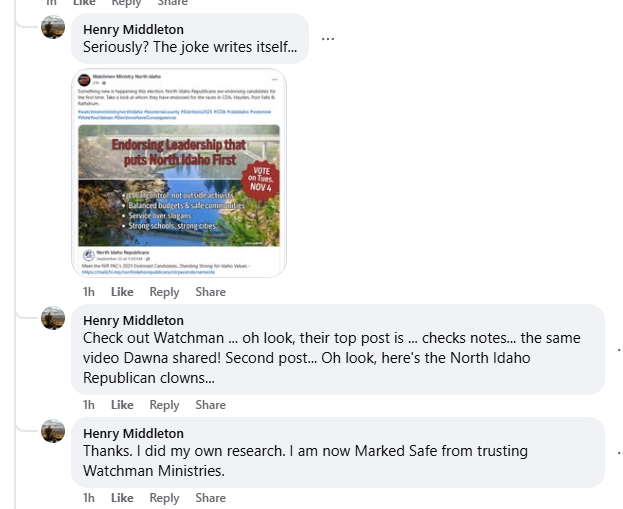When Pastors Attack: How Matt Irving’s Online Deception and Disparagement of Watchmen Ministry North Idaho Expose a Deeper Problem
Introduction: A Pastor, a Fake Identity, and a Community Divided
In early October 2025, Liberty Without Compromise released an investigation revealing that Pastor Matt Irving of Northstar Baptist Church in Hayden, Idaho had allegedly operated a fake Facebook account under the name “Henry Middleton.”
Using that alias, he defended the Kootenai County Republican Central Committee (KCRCC) and attacked critics while publicly presenting himself as a pastor devoted to truth.
Now, additional fallout is spreading through North Idaho’s faith community after Irving’s fake account reportedly disparaged Watchmen Ministry North Idaho, a local Christian organization that produces non-partisan voter guides. The situation raises a troubling question: what happens when those called to shepherd others use their platform to wound fellow believers?

A Brief Recap: What the Original Investigation Found
The Liberty Without Compromise report linked Pastor Irving to the fake profile “Henry Middleton,” which appeared in local political discussions following LWC’s exposé on the KCRCC’s vetting process.
Rather than engaging in open debate, “Middleton” mocked critics and framed legitimate concerns as “whining.”
Public documents also raised questions about Irving’s property records and political ambitions, suggesting he was building influence both inside and outside the pulpit.
The story touched a nerve because it illustrated something many in Kootenai County have suspected for years: that a small network of politically aligned pastors and officials manipulate local discourse while preaching morality from the stage.
When Spiritual Leadership Turns Political
Pastors hold enormous trust. Their words shape communities, families, and faith itself. When that trust is misused, even through something as “simple” as a fake account, the betrayal cuts deep. A pastor engaging in deception to defend a political organization undermines both his moral authority and the credibility of the church he leads.
But the problem grew worse when Irving’s hidden identity was reportedly used to attack another Christian ministry, crossing a line from political maneuvering into spiritual harm.
Watchmen Ministry North Idaho Speaks Out
After seeing the comments posted by “Henry Middleton,” the founders of Watchmen Ministry North Idaho issued a public statement condemning the attacks and expressing shock that a pastor would participate in such behavior.
“Those that create gossip, especially with the intent to ruin someone’s good reputation, should be ashamed of themselves,” wrote the ministry’s founders. “It is an abuse of authority to knowingly lie about another brother and sister in Christ.”
Watchmen Ministry, a husband-and-wife-run nonprofit, has spent six years creating voter guides and educational materials to help residents of North Idaho make informed decisions. They receive no party funding and have worked with believers across political lines. Their mission, as stated on their website, is to “equip Christians to engage with truth, compassion, and discernment.” The discovery that a local pastor may have used a fake account to tear down their ministry was, in their words, “cowardly, deceitful, and disgraceful.”
Why This Matters Beyond One Church
The controversy isn’t just about personal conduct; it highlights a growing crisis of credibility within faith-based political engagement. When pastors become partisan enforcers rather than spiritual guides, they risk turning congregations into ideological echo chambers.
The founders of Watchmen Ministry put it plainly:
“No one should be banned from having friends or conversations simply because others disagree. That’s not Christianity—that’s control. When you can’t think or speak freely, that’s a cult, not a church.”
Their words point to a broader danger, the weaponization of faith for political power.
In communities like Hayden and Coeur d’Alene, where church and civic life overlap heavily, a pastor’s endorsement or disapproval can shape reputations overnight. When that influence is abused through gossip or deception, the ripple effects can destroy unity and trust across the entire region.
The Ethical Weight of the Pulpit
Scripture calls leaders to be “above reproach.” For a pastor, that means truth must never be optional. When a man who preaches honesty on Sunday hides behind a pseudonym online to demean others, it signals a spiritual and ethical crisis.
Criticism and debate are part of public life, but pastors hold a higher calling. They are entrusted not just with influence, but with souls. Attacking a fellow ministry devoted to educating voters, especially under false pretenses, betrays both that trust and the biblical command to “speak the truth in love.”
A Call for Discernment in the Faith Community
The Watchmen Ministry’s response went beyond defending their own reputation. They urged believers to discern what kind of leadership they follow:
“Not all who claim to be anointed are appointed by God. We must take a step back and ensure everything we do aligns with Scripture. Tearing each other down for the sake of politics is not the way.”
Their words echo the warning that this scandal represents more than one pastor’s moral failure, it’s a symptom of a culture where political loyalty has begun to replace spiritual accountability.
The challenge now falls to North Idaho’s churches: Will they choose truth and reconciliation, or remain silent in the face of deceit?
The Bigger Picture: Restoring Trust
For decades, North Idaho has prided itself on independence, faith, and civic engagement. But those values mean little when spiritual leaders abandon truth for influence. Whether or not Pastor Irving faces institutional accountability, the lasting question is one of legacy: Will this region continue tolerating deception from its pulpits?
Restoring trust requires more than outrage. It requires transparency, repentance, and a renewed commitment to separating ministry from manipulation.
Conclusion: Faith Without Deception
The story of Pastor Matt Irving is a warning to every community where politics and religion intertwine. When those entrusted to lead exploit faith to defend power, they erode both.
Watchmen Ministry North Idaho’s steadfast, gracious response is a reminder of what true Christian leadership looks like including humility, courage, and unwavering commitment to truth. For Kootenai County, the choice is clear: reject fake identities, false witness, and political partisanship disguised as faith.
The church must once again become a place of integrity, not influence.

Dawna Wilson is the dynamic co-host and producer of Liberty Without Compromise, a weekly livestream uncovering the political undercurrents of Kootenai County, from local officials and influencers to hidden alliances. With a professional background in on-air broadcasting, Dawna brings sharp storytelling and journalistic integrity to every episode, providing clarity and depth on complex local and national issues. Her work is driven by a commitment to truth, transparency, and accountability in local governance.
Beyond the broadcast, she serves as a media consultant and producer for national and international brands, recognized for her strategic communication, production quality, and high-performing campaigns.
